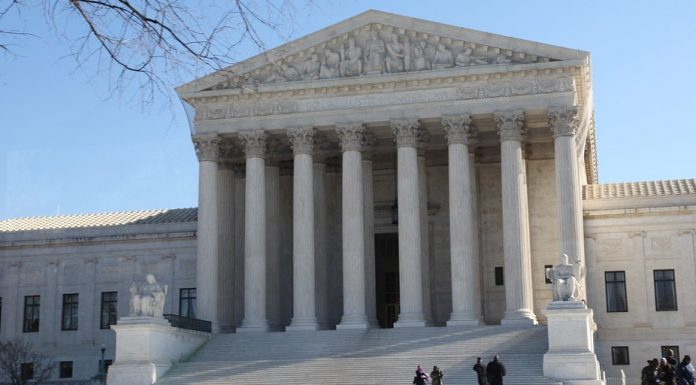(Headline USA) The Supreme Court on Thursday ordered California to stop collecting the names and addresses of top donors to charities.
The justices voted 6-3 to side with two nonprofit groups, including one with links to billionaire Charles Koch.
The dissents came from liberal justices Stephen Breyer, Elena Kagan and Sonia Sotomayor.
The nonprofits argued that California‘s policy of collecting the information violates the First Amendment.
The nonprofits had drawn strong support from groups across the political spectrum, including the liberal nonprofits American Civil Liberties Union and NAACP Legal Defense and Educational Fund.
“The Supreme Court has confirmed that every American is free to peacefully support causes they believe in without fear of harassment or intimidation,” said Alliance Defending Freedom Senior Counsel John Bursch. “Public advocacy is for everyone, not just those able to weather abuse. Forced donor disclosure is a threat to everyone and discourages both charitable giving and participation in the marketplace of ideas. The court correctly upheld the First Amendment’s promise of the freedom to associate with like-minded groups, which includes the right to donor privacy.”
California had defended its policy by saying that the information’s collection was necessary to prevent fraud.
But Chief Justice John Roberts wrote in a majority opinion that there is a “dramatic mismatch” between California’s interest in preventing wrongdoing by charities and its donor information requirement.
“The upshot is that California casts a dragnet for sensitive donor information from tens of thousands of charities each year, even though that information will become relevant in only a small number of cases involving filed complaints,” Roberts wrote.
In a dissent, Justice Sonia Sotomayor warned of the decision’s consequences.
“Today’s analysis marks reporting and disclosure requirements with a bull’s-eye. Regulated entities who wish to avoid their obligations can do so by vaguely waving toward First Amendment ‘privacy concerns,'” she said.
California requires all charities that collect money from state residents to give the state an IRS form identifying their largest contributors.
The information is not supposed to be disclosed publicly. Just three other states, Hawaii, New Jersey and New York, require charities to provide the IRS form.
A federal appeals court had upheld California’s practice, ruling that the information serves the important state goal of preventing charities from committing fraud. The information was unlikely to be released publicly, the 9th U.S. Circuit Court of Appeals said.
However, that circuit’s finding was undermined by California’s own past data mismanagement, in which donors’ identities have been revealed online, according to Courthouse News Service:
California has long insisted that it will not share the information it gathers, and legislative efforts aimed at beefing up security abound, but the state’s own history of data vulnerabilities undercut those assurances.
A 6-3…majority of the high court focused on that vulnerability in striking the law down as unconstitutional Thursday.
“Given the amount and sensitivity of this information harvested by the state, one would expect Schedule B collection to form an integral part of California’s fraud detection efforts,” Chief Justice John Roberts wrote for the majority. “It does not. To the contrary, the record amply supports the District Court’s finding that there was not ‘a single, concrete instance in which pre-investigation collection of a Schedule B did anything to advance the attorney general’s investigative, regulatory or enforcement efforts.’”
The conservative Americans for Prosperity Foundation found ample examples of lax data control while its 2014 case was pending in U.S. District Court for the Central District of California. As recounted in an amicus brief by a group on the opposite side of the political spectrum, the American Civil Liberties Union, the foundation found nearly 1,800 confidential disclosure forms on the website for the State Registry of Charitable Trusts.
The two groups that had challenged California’s requirements are the Michigan-based Thomas More Law Center and Americans for Prosperity Foundation, a charitable organization connected to the primary political organization supported by Koch and his brother, David, who died in 2019.
Koch’s organizations have spent hundreds of millions of dollars supporting Republican candidates and conservative policies, making them frequent targets of attacks by Democrats.
Adapted from reporting by Associated Press.

